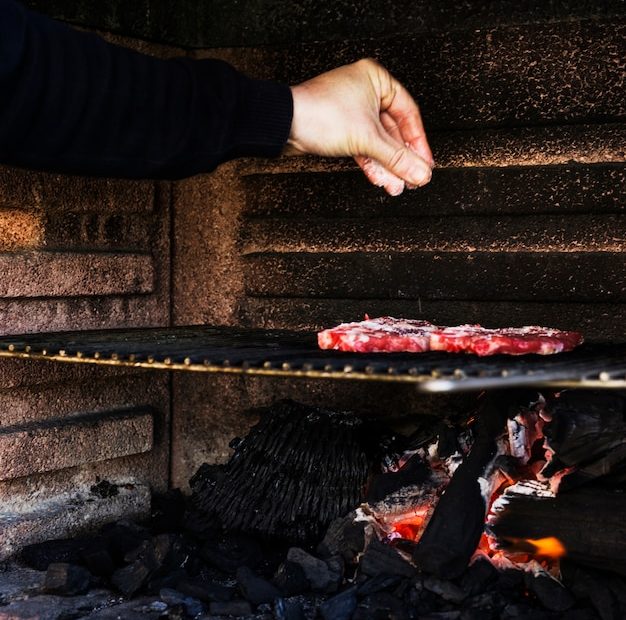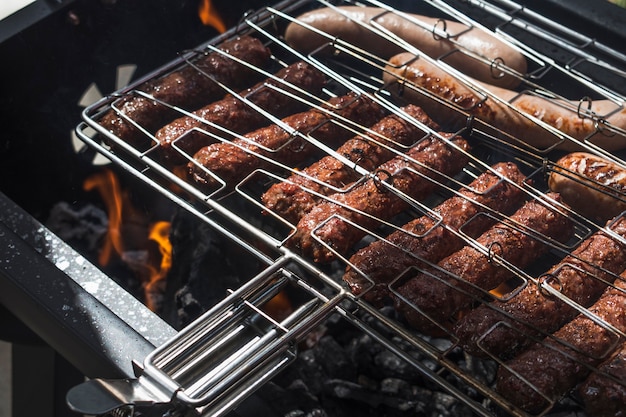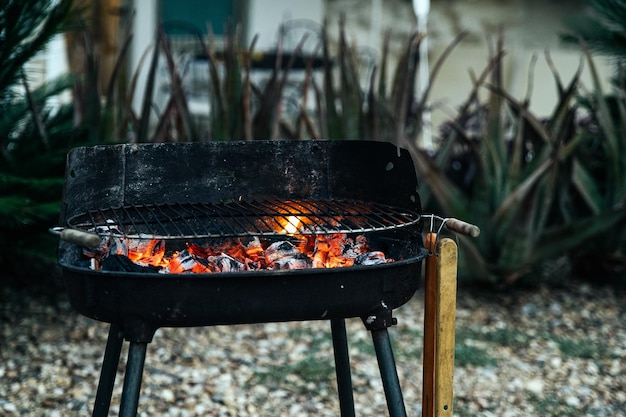How long do BBQ coals last?
When it comes to cooking outdoors, few things are as satisfying as firing up the barbecue. Whether you’re grilling burgers, roasting vegetables, or slow-cooking a tender piece of meat, the smoky flavor and charred goodness make it all worth it. While we often focus on the food and marinades, one important factor that can greatly impact the success of your barbecue session is the longevity of your charcoal or briquettes.
Types of BBQ Coals
Before delving into the lifespan of BBQ coals, it’s essential to understand the different types available. There are primarily two types: lump charcoal and charcoal briquettes.
Lump charcoal is made by burning wood in the absence of oxygen, resulting in charred remains. It is favored by many barbecue enthusiasts for its natural smoky flavor and high heat output. Lump charcoal ignites quickly, burns hotter, and produces less ash compared to briquettes.
Charcoal briquettes, on the other hand, are manufactured using a combination of charcoal dust, sawdust, and various additives. They are compressed into uniform shapes, making them convenient and easier to handle. Charcoal briquettes often burn longer and more consistently than lump charcoal, making them a popular choice for extended grilling sessions.
The Lifespan of BBQ Coals
The lifespan of BBQ coals varies depending on several factors, including the type of coal used, weather conditions, and the cooking method. In general, lump charcoal tends to burn faster than briquettes due to its irregular shape and lack of binding agents. However, both types can last for a considerable amount of time if used correctly.
On average, a standard bag of charcoal briquettes can last anywhere from 2 to 3 hours for grilling purposes. This duration is usually long enough for most outdoor gatherings and casual barbecues. However, if you’re planning a marathon cooking session or slow-cooking large cuts of meat, you may need to replenish the coals halfway through.
Lump charcoal, though it burns faster, can still provide around 1 to 2 hours of grilling time. It excels in achieving higher temperatures quickly, making it ideal for searing steaks or cooking foods that require intense heat.
Factors Affecting Coal Lifespan
The longevity of your BBQ coals can be influenced by several factors, including:
- Weather conditions: Windy conditions can accelerate the burning process, while rain or high humidity may delay ignition or slow down combustion.
- Cooking style: Different cooking methods such as direct grilling, indirect grilling, or smoking can affect how quickly the coals burn.
- Grill airflow: Proper airflow control on your grill can help regulate the burn rate and extend the lifespan of your coals.
- Amount of charcoal used: Using more charcoal than necessary can lead to excessive heat and faster burnout.
Tip: To maximize the lifespan of your BBQ coals, consider using a chimney starter to ignite them. This method allows for even heating and ensures the coals are fully lit before transferring them to the grill.
Extending the Lifespan
If you find yourself needing to extend the lifespan of your BBQ coals, there are a few strategies you can employ:
- Baking soda: Sprinkling a small amount of baking soda on your coals can help reduce the burn rate and prolong their lifespan.
- Cooking techniques: Opt for indirect grilling or smoking methods, which require lower heat and can make your coals last longer.
- Control airflow: Adjust the vents on your grill to control oxygen flow. Closing them slightly can slow down combustion and extend the lifespan of the coals.
Remember, the lifespan of your BBQ coals is not only determined by their initial burn time but also by how effectively you maintain and control the heat throughout your cooking session.
So, whether you prefer the quick heat of lump charcoal or the longevity of charcoal briquettes, understanding the lifespan of your coals and implementing suitable techniques will ensure that your barbecue sessions are a success every time.
Why does my charcoal burn out so fast?
Barbecuing is a beloved pastime in the UK, and grilling enthusiasts know that using charcoal is a great way to achieve that smoky flavor. However, have you ever wondered why your charcoal burns out so quickly? Here are some potential reasons:
Poor quality charcoal
The quality of the charcoal you use can significantly impact its burning time. Cheap, low-quality charcoal often contains more impurities and additives, which can cause it to burn faster. Investing in higher-quality charcoal made from natural hardwood can help you achieve a longer burn time.
Insufficient airflow
Adequate airflow is crucial for maintaining a consistent burn. If your charcoal doesn’t receive enough oxygen, it may burn out quickly. Make sure to arrange your charcoal in a well-ventilated area and avoid overcrowding the grill.
Inconsistent coal size
Charcoal briquettes come in different sizes, and using a mix of large and small pieces can impact how quickly they burn. Smaller pieces tend to ignite and burn faster, while larger ones provide a slower, more extended burn. Consider sorting your charcoal by size to create a more balanced fire.
Incorrect lighting technique
The way you light your charcoal can also affect its burning time. Using lighter fluid or self-lighting charcoal may cause a rapid initial burn but can lead to faster consumption. Opt for natural fire starters or a chimney starter to ensure a more controlled burn.
Insufficient preheating
Preheating your charcoal before cooking is essential for achieving a stable temperature and longer burn time. Allow your charcoal to burn until it develops a layer of white ash on the surface, indicating it’s ready for cooking.
By considering these factors, you can improve your grilling experience and enjoy longer-lasting charcoal fires. Remember, the key is to invest in good-quality charcoal, provide adequate airflow, use consistent coal sizes, employ proper lighting techniques, and ensure sufficient preheating.
How do you keep coals burning longer?
1. Choose the right type of coal
When trying to keep coals burning for a longer period of time, it’s important to start with the right kind of coal. Opt for quality smokeless or anthracite coal, as they are denser and burn slower compared to other types of coal.
2. Properly stack your coals
The way you stack your coals can affect their burning time. To maximize burn time, create a tight, compact stack of coals with minimal gaps between them. This will ensure efficient heat distribution and reduce the chance of premature coal extinguishment.
3. Use a chimney starter
A chimney starter is a handy tool that helps coals burn evenly and for a longer duration. It allows for proper air circulation, which promotes consistent heat and prevents the coals from dying out too quickly. Simply load the chimney with coal, light the bottom, and let it preheat until the coals turn gray.
4. Control airflow
Regulating the airflow is crucial in extending the lifespan of burning coals. Make sure to adjust the vents on your charcoal grill or barbecue to control the oxygen flow. Reducing the airflow will slow down the combustion process and help the coals burn longer.
5. Minimize disturbance
Avoid unnecessary disturbance to the burning coals, as this can cause them to die out prematurely. Refrain from constantly stirring or poking the coals, as it disrupts their burning pattern and can extinguish them faster. Only stir when necessary for adjusting heat levels.
“Choosing the right type of coal and properly stacking it can significantly improve burn time.”
To summarize, achieving a longer burning time for your coals involves selecting the right type of coal, stacking them properly, using a chimney starter, controlling airflow, and minimizing disturbance. By following these tips, you can enjoy extended cooking sessions or cozy bonfires without constantly needing to replenish the coals.
How long should charcoal stay hot?
When it comes to barbecuing, one of the most common questions is how long charcoal should stay hot. The answer depends on various factors, including the type of charcoal used and the grilling method. Let’s take a closer look at what affects the duration of hot charcoal.
Type of Charcoal
The type of charcoal you use plays a significant role in determining how long it will stay hot. Lump charcoal, made from natural wood, tends to burn hotter and longer than briquettes. Typically, lump charcoal can stay hot for around 1-2 hours, while briquettes may last up to 3 hours. However, these durations can vary depending on other factors as well.
Airflow and Ventilation
Adequate airflow and ventilation are crucial for maintaining a steady heat supply. Opening the vents in your grill or smoker allows oxygen to fuel the charcoal, keeping it burning consistently. Proper ventilation can extend the charcoal’s hotness and provide a stable cooking temperature.
Grilling Method
The grilling method you choose also impacts how long charcoal stays hot. Direct grilling, where food is cooked directly over the hot coals, requires high heat for a shorter duration. Indirect grilling, on the other hand, involves placing the food next to the heat source but not directly over it. This method requires lower heat, which can be sustained for a longer period.
Pro Tip: To prolong the hotness of your charcoal, consider adding unlit charcoal to the lit coals during the cooking process. This technique, known as the “fuse method,” gradually ignites new coals, providing extended heat.
Remember that weather conditions and the size of your grill can also affect how long charcoal stays hot. Cooler temperatures and larger grills may require additional charcoal to maintain consistent heat. Experimenting with different types of charcoal and grilling techniques will help you find the ideal balance for your barbecuing needs.
How do you keep charcoal lit?
When it comes to outdoor cooking, charcoal grilling is a popular choice for its distinct smoky flavor. However, many people struggle with keeping the charcoal lit throughout the grilling process. Here are some tips to ensure your charcoal stays lit, allowing you to enjoy delicious barbecued food:
- Use the right type of charcoal: Start by choosing high-quality briquettes or lump charcoal. Briquettes, made from crushed charcoal and other additives, burn longer and more consistently. Lump charcoal, made from natural hardwood, burns hotter but can be less predictable.
- Build a proper charcoal pyramid: Arrange the charcoal in a pyramid shape, leaving some space between the coals for air circulation. This allows for better airflow and helps the coals ignite faster.
- Use lighter fluid or chimney starter: To ignite the charcoal, you can either use lighter fluid or a chimney starter. If using lighter fluid, soak a few newspaper sheets in it and place them under the charcoal pyramid. Light the newspaper and wait for the coals to ignite. A chimney starter, on the other hand, eliminates the need for lighter fluid and provides a safer alternative.
- Let the charcoal ash over: Once the coals start to ignite, let them burn until they are covered with gray ash. This indicates that the charcoal is at the ideal temperature for grilling and will provide a more consistent heat source.
- Control the airflow: To maintain a steady burn, adjust the airflow by using the air vents on your grill. Opening the vents allows more oxygen to reach the coals, increasing the heat, while closing them reduces the airflow and lowers the temperature.
- Avoid excessive flipping: While grilling, avoid frequently flipping the food. Constantly opening the grill lid can disrupt the airflow and cause the charcoal to lose heat or even extinguish.
If you still find it challenging to keep your charcoal lit, consider investing in a charcoal chimney starter. This tool simplifies the process by ensuring consistent ignition and eliminating the need for lighter fluid.
“Using the right type of charcoal and allowing it to ash over before cooking are crucial steps in keeping your charcoal lit.”
By following these tips and using some of the best practices, you can enhance your charcoal grilling experience and achieve perfectly grilled meals every time.


